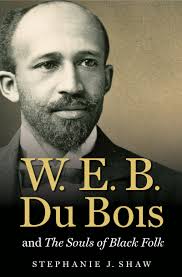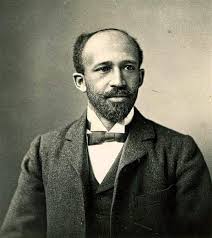The Souls of Black Folk Page #31
The Souls of Black Folk is a 1903 work of American literature by W. E. B. Du Bois. It is a seminal work in the history of sociology and a cornerstone of African-American literature. The book contains several essays on race, some of which the magazine Atlantic Monthly had previously published.
Above all, the cabins are crowded. We have come to associate crowding with homes in cities almost exclusively. This is primarily because we have so little accurate knowledge of country life. Here in Dougherty County one may find families of eight and ten occupying one or two rooms, and for every ten rooms of house accommodation for the Negroes there are twenty-five persons. The worst tenement abominations of New York do not have above twenty-two persons for every ten rooms. Of course, one small, close room in a city, without a yard, is in many respects worse than the larger single country room. In other respects it is better; it has glass windows, a decent chimney, and a trustworthy floor. The single great advantage of the Negro peasant is that he may spend most of his life outside his hovel, in the open fields. There are four chief causes of these wretched homes: First, long custom born of slavery has assigned such homes to Negroes; white laborers would be offered better accommodations, and might, for that and similar reasons, give better work. Secondly, the Negroes, used to such accommodations, do not as a rule demand better; they do not know what better houses mean. Thirdly, the landlords as a class have not yet come to realize that it is a good business investment to raise the standard of living among labor by slow and judicious methods; that a Negro laborer who demands three rooms and fifty cents a day would give more efficient work and leave a larger profit than a discouraged toiler herding his family in one room and working for thirty cents. Lastly, among such conditions of life there are few incentives to make the laborer become a better farmer. If he is ambitious, he moves to town or tries other labor; as a tenant-farmer his outlook is almost hopeless, and following it as a makeshift, he takes the house that is given him without protest. In such homes, then, these Negro peasants live. The families are both small and large; there are many single tenants,—widows and bachelors, and remnants of broken groups. The system of labor and the size of the houses both tend to the breaking up of family groups: the grown children go away as contract hands or migrate to town, the sister goes into service; and so one finds many families with hosts of babies, and many newly married couples, but comparatively few families with half-grown and grown sons and daughters. The average size of Negro families has undoubtedly decreased since the war, primarily from economic stress. In Russia over a third of the bridegrooms and over half the brides are under twenty; the same was true of the antebellum Negroes. Today, however, very few of the boys and less than a fifth of the Negro girls under twenty are married. The young men marry between the ages of twenty-five and thirty-five; the young women between twenty and thirty. Such postponement is due to the difficulty of earning sufficient to rear and support a family; and it undoubtedly leads, in the country districts, to sexual immorality. The form of this immorality, however, is very seldom that of prostitution, and less frequently that of illegitimacy than one would imagine. Rather, it takes the form of separation and desertion after a family group has been formed. The number of separated persons is thirty-five to the thousand,—a very large number. It would of course be unfair to compare this number with divorce statistics, for many of these separated women are in reality widowed, were the truth known, and in other cases the separation is not permanent. Nevertheless, here lies the seat of greatest moral danger. There is little or no prostitution among these Negroes, and over three-fourths of the families, as found by house-to-house investigation, deserve to be classed as decent people with considerable regard for female chastity. To be sure, the ideas of the mass would not suit New England, and there are many loose habits and notions. Yet the rate of illegitimacy is undoubtedly lower than in Austria or Italy, and the women as a class are modest. The plague-spot in sexual relations is easy marriage and easy separation. This is no sudden development, nor the fruit of Emancipation. It is the plain heritage from slavery. In those days Sam, with his master’s consent, “took up” with Mary. No ceremony was necessary, and in the busy life of the great plantations of the Black Belt it was usually dispensed with. If now the master needed Sam’s work in another plantation or in another part of the same plantation, or if he took a notion to sell the slave, Sam’s married life with Mary was usually unceremoniously broken, and then it was clearly to the master’s interest to have both of them take new mates. This widespread custom of two centuries has not been eradicated in thirty years. To-day Sam’s grandson “takes up” with a woman without license or ceremony; they live together decently and honestly, and are, to all intents and purposes, man and wife. Sometimes these unions are never broken until death; but in too many cases family quarrels, a roving spirit, a rival suitor, or perhaps more frequently the hopeless battle to support a family, lead to separation, and a broken household is the result. The Negro church has done much to stop this practice, and now most marriage ceremonies are performed by the pastors. Nevertheless, the evil is still deep seated, and only a general raising of the standard of living will finally cure it. Looking now at the county black population as a whole, it is fair to characterize it as poor and ignorant. Perhaps ten per cent compose the well-to-do and the best of the laborers, while at least nine per cent are thoroughly lewd and vicious. The rest, over eighty per cent, are poor and ignorant, fairly honest and well meaning, plodding, and to a degree shiftless, with some but not great sexual looseness. Such class lines are by no means fixed; they vary, one might almost say, with the price of cotton. The degree of ignorance cannot easily be expressed. We may say, for instance, that nearly two-thirds of them cannot read or write. This but partially expresses the fact. They are ignorant of the world about them, of modern economic organization, of the function of government, of individual worth and possibilities,—of nearly all those things which slavery in self-defence had to keep them from learning. Much that the white boy imbibes from his earliest social atmosphere forms the puzzling problems of the black boy’s mature years. America is not another word for Opportunity to all her sons.
Translation
Translate and read this book in other languages:
Select another language:
- - Select -
- 简体中文 (Chinese - Simplified)
- 繁體中文 (Chinese - Traditional)
- Español (Spanish)
- Esperanto (Esperanto)
- 日本語 (Japanese)
- Português (Portuguese)
- Deutsch (German)
- العربية (Arabic)
- Français (French)
- Русский (Russian)
- ಕನ್ನಡ (Kannada)
- 한국어 (Korean)
- עברית (Hebrew)
- Gaeilge (Irish)
- Українська (Ukrainian)
- اردو (Urdu)
- Magyar (Hungarian)
- मानक हिन्दी (Hindi)
- Indonesia (Indonesian)
- Italiano (Italian)
- தமிழ் (Tamil)
- Türkçe (Turkish)
- తెలుగు (Telugu)
- ภาษาไทย (Thai)
- Tiếng Việt (Vietnamese)
- Čeština (Czech)
- Polski (Polish)
- Bahasa Indonesia (Indonesian)
- Românește (Romanian)
- Nederlands (Dutch)
- Ελληνικά (Greek)
- Latinum (Latin)
- Svenska (Swedish)
- Dansk (Danish)
- Suomi (Finnish)
- فارسی (Persian)
- ייִדיש (Yiddish)
- հայերեն (Armenian)
- Norsk (Norwegian)
- English (English)
Citation
Use the citation below to add this book to your bibliography:
Style:MLAChicagoAPA
"The Souls of Black Folk Books." Literature.com. STANDS4 LLC, 2025. Web. 10 Jan. 2025. <https://www.literature.com/book/the_souls_of_black_folk_310>.




Discuss this The Souls of Black Folk book with the community:
Report Comment
We're doing our best to make sure our content is useful, accurate and safe.
If by any chance you spot an inappropriate comment while navigating through our website please use this form to let us know, and we'll take care of it shortly.
Attachment
You need to be logged in to favorite.
Log In